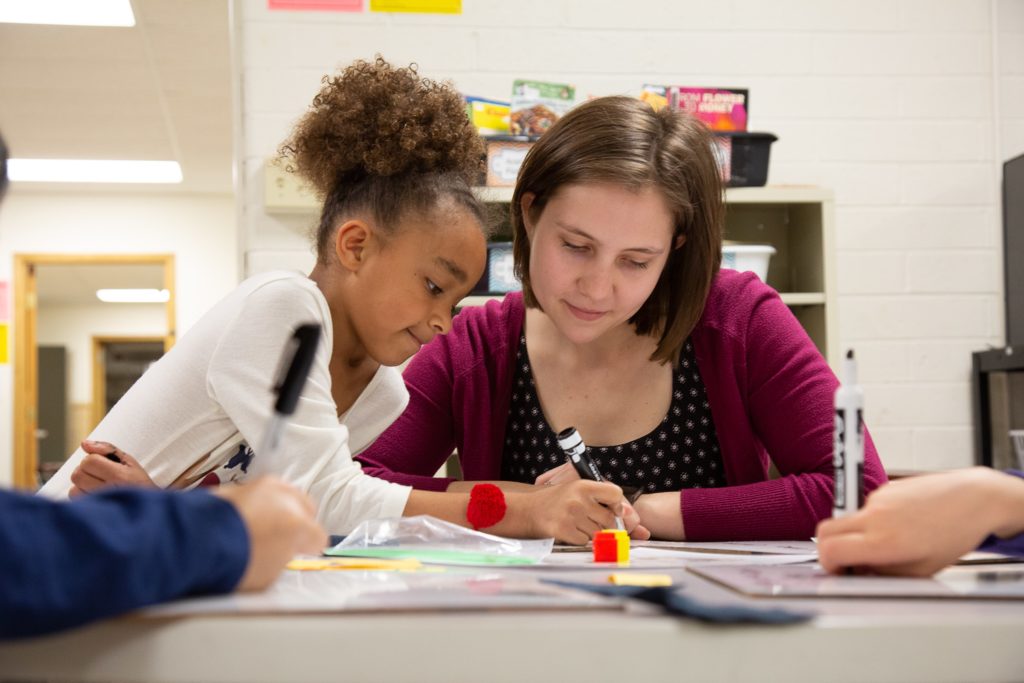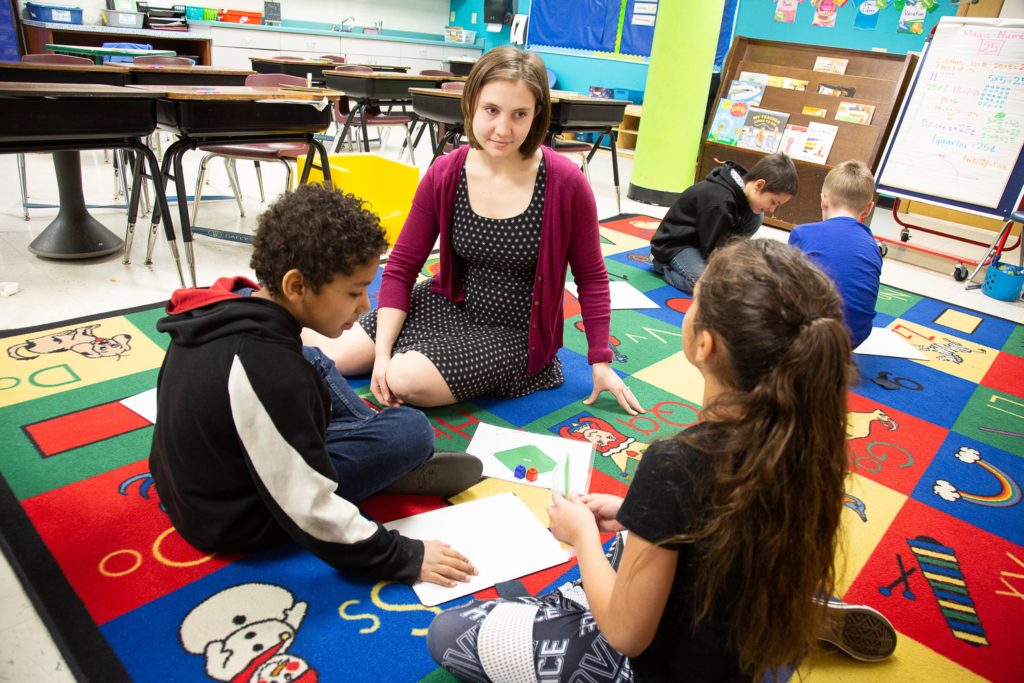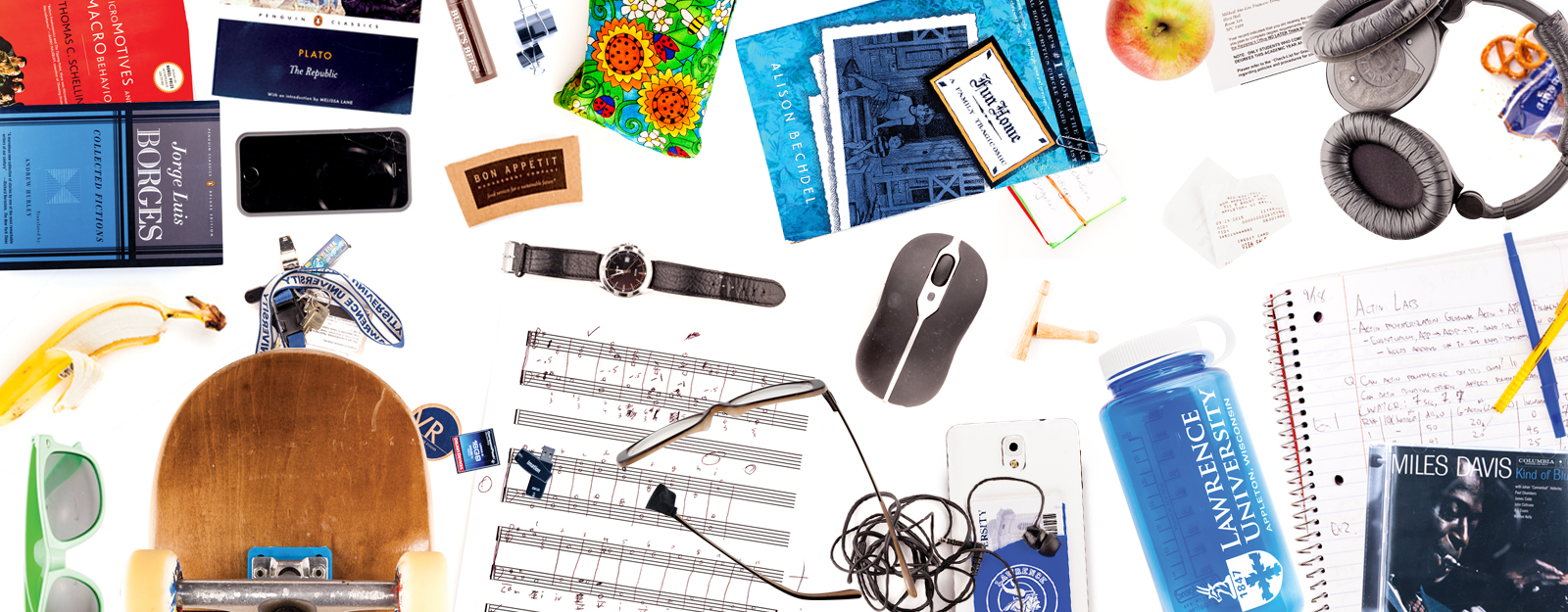
Story by Ed Berthiaume / Communications
Michelle Gibson ’17 had visions of being a religious studies professor.
She arrived at Lawrence University six years ago as a first-year student enamored with the idea of teaching about life’s mysteries, about how our human qualities make us more alike than different despite our cultural and faith histories and how a thirst for learning can lead us to the inner peace we crave.
Today, nearly two years after graduating as a religious studies major, Gibson is indeed teaching those principles she holds so dear. But the students staring back at her, well, they’re a little younger than the college students she once envisioned.
Welcome to Appleton’s Lincoln Elementary School, where Gibson is a second-grade teacher, one year removed from a year-long apprenticeship program that provided a different path to the classroom than most of her teaching peers.
It turns out Gibson’s journey through Lawrence ignited a new spark, one that called her to the elementary classroom. And the launching of an apprentice partnership between Lawrence and the Appleton Area School District proved to be ideal timing, providing the opportunity she was looking for.
Gibson became one of the first two graduates of the Teacher Education Apprenticeship Program, and on April 28 she was honored with the Early Career Education Award presented by the Wisconsin Association of Colleges for Teacher Education (WACTE). The award goes to teachers in their first three years of teaching who are already making an impact.
It was during Gibson’s sophomore year at Lawrence — her last name was Johnson then — that the seeds of a new career were first planted. She took a sociology of education course that brought her into a kindergarten classroom during her practicum.
“I realized that when I was in that classroom, that was when I felt the most at home and actually felt happy,” she said. “I wasn’t stressed. It was almost like a release for me to go hang out with those kids.”

But it wasn’t until the following year, when she took a philosophy of children class taught by Assistant Professor of Education Stephanie Burdick-Shepherd, that she was convinced the elementary classroom would indeed be her calling.
“That’s when I realized, oh my goodness, I need to teach,” Gibson said. “We were finding ways where you can pose these philosophical questions like you do in religious studies, but with children.”
In a religious studies college classroom, she figured she would mostly be speaking to students with a similar view of the world — “We are all human, we are all the same, we need to find the sameness within us to really come together as a world and as a community,” she said.
“Or I could go into an elementary classroom and be working with young students and really be helping them to see that truth and having those large philosophical conversations with them about the sameness within people and how as humans we are more alike than different, and how that can build community rather than divide us.”
That’s where the post-graduate apprenticeship program, a collaboration between Lawrence, the school district and the Mielke Family Foundation, pays dividends. It allows for undergraduates in any major at Lawrence to apply for admittance, giving them a one-year path to teacher certification as an elementary teacher.
“Our program is rare in the sense that, at its core, what we value most is the education of the liberal arts, that an education about learning to love and engage deeply in learning across disciplines and subject areas is the best preparation for teaching young children,” Burdick-Shepherd said. “The elementary school teacher teaches how to learn, and our students learn to teach learning in our elementary teacher certification program.”
Lawrence saw two graduates, Gibson being one of them, jump into the apprenticeship program in 2017. Another graduate is in the program this year and two more are lined up for next school year.
Burdick-Shepherd said her courses that are focused on working with young children are consistently full, and not just with students on a teaching path. And, as they did for Gibson, such courses might just light that fire.
“Michelle is a shining example of how someone who never saw themselves as an elementary teacher learns to recognize a call to change the world by working with young people,” Burdick-Shepherd said. “Michelle is one of LU’s outstanding alums. There was not a book you could throw at her that she wouldn’t read deeply. She wrote magnificently. A religious studies major, she traveled the world engaging deeply with other cultures and traditions.
“Michelle could do any job she wanted, but she chose to learn to teach. I think she chose this because she wanted to share her love of learning in the most impactful way she could.”
Gibson, who grew up in Minoqua, was one of two teachers honored by WACTE. The other is Dan Singer, a band teacher at Oshkosh West High School who has mentored eight student-teachers from Lawrence through the years.
Lawrence’s apprenticeship program, Gibson said, provided the guidance she needed to transition smoothly into an elementary teaching career.
“The apprenticeship, that’s when you really felt, OK, this is what teaching actually looks like,” she said. “This isn’t just reading from a textbook on what teaching looks like, this is actually what it looks and feels and smells and is like.”
She liked the full-year apprenticeship, as opposed to a one-semester student-teaching stint. It provided time to absorb, to adjust, and to ask questions.
“I knew I had an entire year to see where the kids grew, where they started off and where they ended, and I could even map my own growth alongside them,” Gibson said.
She also found her teaching style, her own pacing and methods of student interaction, heavily influenced by her liberal arts background. That’s an important thing, a base to build on.
“I could just start off with a very inquiring style of teaching,” she said.
“I had Lawrence modeling, that conversational style of teaching in the college setting, which was actually very easy to transition into a first- or second-grade room.”
Ed Berthiaume is director of public information at Lawrence University. Email: ed.c.berthiaume@lawrence.edu

Recent Comments